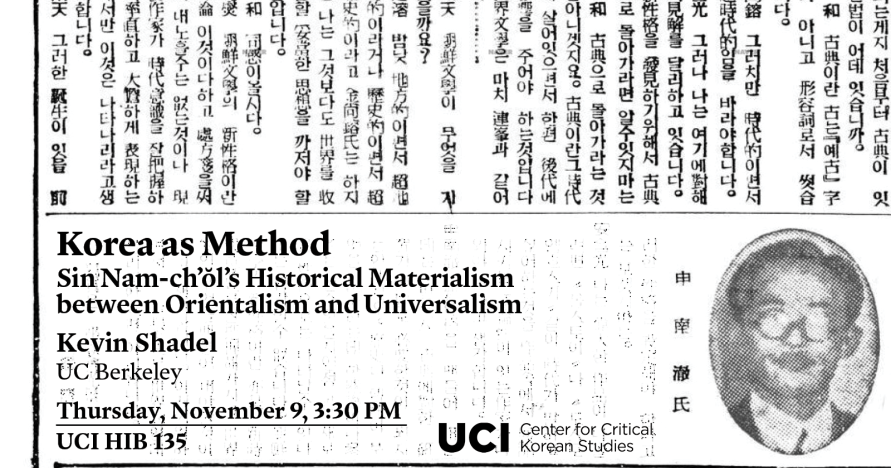
[CANCELED] Korea as Method: Sin Nam-ch’ŏl’s Historical Materialism between Orientalism and Universalism
Kevin Shadel
UC Berkeley Thursday, November 9, 3:30 PM PDT
UCI HIB 135
In his 1934 essay “A Method for Korean Studies” (Chosŏn yŏn’gu ŭi pangbŏmnon), the Hegelian-Marxist philosopher Sin Nam-ch’ŏl (1903-??) advocated an historical method of analysis which “recognizes the development of the totality of social relations as the material basis of society.” In so doing, Sin chastised so-called “folk scholars” (min’gan hakja) such as Ch’oe Nam-sŏn and Sin Ch’ae-ho for their “fetishization” (sinbihwa) of Korea’s particularity through an ahistorical and psychologizing method deriving from the cult of Tan’gun, ancient Korea’s first ruler. For Sin, recognition of the dialectical relationship between present conditions and the historical object of research was an essential step toward dispelling what Eric Hobsbawm and Terence Ranger would call the “invention of tradition.” This presentation aims to contextualize Sin’s contribution to the incipient field of “Korean Studies” (Chosŏnhak) in response to the Japanese colonial government’s demand for knowledge about Korea compatible with and justificatory of its policies. In the early 1930s, Sin’s theoretical education at Seoul’s prestigious Keijō Imperial University under the guidance of professor Miyake Shikanosuke brought him into conversation with other prominent leftist intellectuals such as Paek Nam-un and Kim T’ae-jun, whose groundbreaking scholarship on Korea’s economic and literary history worked against colonial discourses of Korea’s purported backwardness and inferiority. But an oppositional right-wing school of thought emerged simultaneously to challenge Japanese claims about Korea not through attention to concrete, immediate social conditions, but with an atavistic and idealistic turn toward national mythmaking. Thus, by detailing Sin’s critical engagement with his compatriots as well as problems of colonial epistemology more broadly, this talk will trace how the universalist current of historical materialism on which he traveled during this era enabled him to circumnavigate the hazards of Orientalist particularism and relativism in both its indigenist and colonialist guises.
